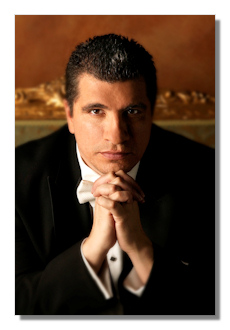
The Internet's Premier Classical Music Source
Related Links
- Latest Reviews
- More Reviews
-
By Composer
-
Collections
DVD & Blu-ray
Books
Concert Reviews
Articles/Interviews
Software
Audio
Search Amazon
Recommended Links
Site News
 Concert Review
Concert Review
Ravishing Rachmaninoff

- George Gershwin: Cuban Overture
- Sergei Rachmaninoff: Rhapsody on a Theme by Paganini *
- Ottorino Respighi: The Fountains of Rome
- Ástor Piazzolla: Sinfonia de Buenos Aires
* Daniel Trifonov, piano
Detroit Symphony Orchestra/Giancarlo Guerrero
Detroit Orchestra Hall, 13 February 2014
Two boisterous and enthusiastic artists brought much to cheer about on a cold Thursday evening. For a midweek performance, it was very well attended, and despite Giancarlo Guerrero's impressive resume, I suspect it was Trifonov that filled the house. The 22-year old phenomenon has already established himself as an exciting young artist, and his contributions to this particular program were staggering. Through all this, the Detroit Symphony Orchestra played tremendously well.
Right from the opening bars of the Gershwin, I was wary. This piece – despite a short nine minute duration – can drag like few others can. Guerrero clearly loves the piece; he drew ravishing playing from the orchestra in slower sections, but his conception simply didn't swagger enough. Sure, there was heat when needed, but it was too little, too late. That said, it did effectively illustrate the conductor's unique flair for this particular sound world; could it be he simply loves the work too much? At any rate, none of the audience seemed to mind as much as I did, the ovation was warm and sustained, and the players had fun with it. So maybe it's just me.
The success of the Rachmaninoff was not up for debate; it was a slamming success. Trifonov is a rising star, and he attacked the Rhapsody with stunning virtuosity. Most importantly, the young pianist effectively balanced the fiery excitement of the work with the more lyrical elements. Here's a man who can effectively make the piano sing in whatever way he wants to. The result was a delight from first note to last, and credit the Detroit Symphony players for keeping up. Guerrero deserves a lot of praise as well, since he refused to let the more poetic sections of the piece linger too long. As in the Gershwin, the conductors' tremendous energy and love of the music was apparent, but there was an alacrity present that made the orchestral contributions more than mere accompaniment.
After that red-hot Rhapsody, the Respighi tone poem was a perfect cool-down, and an inspired way to begin the second half. Some typically wonderful wind playing – entirely expected from these forces – and confidently asserted brass made this a performance to remember. Of the composer's three "Roman" pieces, Fountains is arguably the least exciting, but is also arguably the most beautiful. The Detroit Symphony is practically built for such a piece, one in which strings and woodwinds dominate, and in which the brass simply have to ring out here and there. True to form, Guerrero made another excitable impression, but what didn't work in the Cuban Overture worked wonders here; a real sense of flow, and simply stellar playing.
Guerrero clearly believes in Piazzolla's Sinfonia de Buenos Aires, which is a good thing, because it needs all the believers it can get. It's one heck of a tour-de-force from an orchestral perspective, but I'm unsure how much I actually like the piece as a whole. The outer sections were dazzling, with the Detroit players fired up, but the inner sections convinced less. As exciting as the work bookends, the real meat of the piece is lacking despite some truly imaginative scoring on the part of the composer. Still, it was enough to bring down the house, and everyone involved gave a tremendous effort. Guerrero is a winner, Trifonov is a star, and the Detroit Symphony continues to impress!
Copyright © 2014, Brian Wigman












